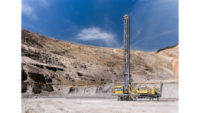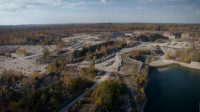In its early days, the company served both wholesale and retail purposes. In 1996, however, Striggow sold the retail division to Pioneer Sand Co., and kept the wholesale division, for which he began supplying moss rock. Soon thereafter, the company also began quarrying Brownstone and Cherokee stone. Due to the ever-growing success of the company, a new retail location has also recently been added.
The quarries currently operate in three locations. Brownstone and Cherokee are prepared in La Porte, CO, and the moss rock site -- where the stone is stockpiled -- is located five miles down the road. Meanwhile, the company's newest endeavor, a retail location called “Rock Garden,†is situated in Fort Collins, CO.
At the La Porte locations, the company's 17 employees rely on a variety of equipment for excavating the stone. Because the stone extraction process relies heavily on equipment for maneuvering large pieces of stone, the quarry contains five wheel loaders, including a Clark Michigan 275C, a Clark Michigan 125C, a Cat IT24F, a Volvo L70 and a Volvo L45B. The wheel loaders are used to transport and sort material to the gangsaws, cutters, or directly to semi-trucks for wall rock and landscape boulders.
The company also has an 8,000-pound extender fork and an Allis Chalmers 6,000-pound forklift. In addition, the Brownstone quarrying process is carried out by the company's three excavators, which include a Cat 235D, a 4800 FMC Link Belt and a John Deere 790E.
Once rough pieces of stone have been taken from the quarry, they are sized with four Chris Cutter hydraulic splitters from Cee Jay Tool, ranging from 2 to 8 feet in size.
The moss rock division has a logging yarder, a D9 dozer, four front-end loaders and a forklift. “The moss rock facility has a logging yarder that 'flies' the boulders down the side of a steep ridge using 1â„4 mile of standing skyline cable system,†said Striggow. “We also use military 5-ton 6WD trucks to bring the moss rock to the stockpile area.â€
Unlike its competitors, Stone Wholesale Corp. also relies on equipment from the past, rather than investing wholeheartedly in modern technology. The gangsaws currently in operation at the company include classic Ty-sa-mans from 1927 and 1952. This brand has not been manufactured since 1970, and the company reworked the gangsaws out of a scrap pile. “We learned to make the Babbitt bearings, the 20-foot-long pitman arms and many moving parts in a trial-and-mostly-error process of about a year,†said the owner. “We also have a water-texturing process that we developed in house.†In addition, Striggow fabricated a large capacity tumbler, which is also useful at the quarry.
“We do most of the quarrying with excavators,†said Striggow. “The stone is separated and categorized into different products as it's brought down the hill. Larger stones are used for the sawing operation, which starts with the two gangsaws.â€
The main goal in establishing the Rock Garden retail location was to create a lush facility in a location where much emphasis is placed on stone. “It's a very attractive facility that will not only welcome retail markets, but we feel we can tap into a larger market by appealing to local architects and contractors as well,†said Striggow.
The location of the retail market is also key. According to Stone Wholesale Corp.'s operation manager, Michael Bekkedahl, the quarries are hidden behind the foothills of northern Colorado, and the retail store will serve as a medium for the company to get in touch with contractors. “Stonemasons who find us are really impressed and say they didn't even know we were back here,†he added.
The company focuses predominantly on large masonry companies, contractors and architects as its clients. “We seem to have a fairly good turnover with just focusing on these three angles,†said Striggow. “A lot of our stone is also being used as thin veneer. We probably ship three semi [trucks] a week to Robinson Brick Co.â€
Stone Wholesale Corp. also has some large landscaping facilities that buy its stone for retail purposes. In addition, there are some larger masonry companies that it deals with, including Gallegos Corp, one of the largest companies west of the Mississippi River.
According to Striggow, Bekkedahl has been instrumental in developing the look of the stone created by the company. “Brownstone is the top layer of formation -- it's the stone that we use the gangsaws with,†said Bekkedahl. “Once the Brownstone is sawn, we refer to it as Watermark Buff because the sawing process creates the watermark look. The slabs that come from the gangsaws are snapped with the cutters or sawn with bridge saws to make the dimensional products.â€
Bekkedahl added that there is about 15 feet of overburden between the Brownstone layer and Cherokee layers. “Cherokee isn't a rock that we generally saw because of its physical characteristics,†he said. “We cut it for veneers -- it's a product that Robinson Brick uses. It has fantastic coloration of mauve, gold and gray, and it is also a pretty popular dry stack wall rock.â€
Stone Wholesale Corp. generally uses moss rock in boulder form for decorative accents in gardens and for retaining walls. Striggow describes this stone as a local phenomenon in Colorado. “Moss is a local name for lichen that grows naturally on the rocks scattered around the foothills,†he said. “It takes about 100 years for lichen to grow and it is delicate. Each rock is like a painting because the lichen has six distinct colors -- green, gray, silver, orange, yellow and black.â€
We are pretty aggressive about developing and seeking new sources of stone and ways to make our products appealing to customers,†he continued. “We are in the process of opening up a third layer in the existing quarry, but we have yet to determine the best application for the rock. We also have another sandstone quarry location in the works that has a completely separate look of character and class.â€
Justyn Hamilton, the company's quarry manager, agrees that the company strives to make things happen for customers. “When working with designers, we usually create products that they are dreaming up,†he said.
“We are willing to work with and be creative with customers. The look of the Watermark Buff stone is unlike anything else on the market. People like to use it to give their projects a look of character and class.â€
With over 20 years experience, the company also prides itself on creating specialized products based on customer's requests. “We generate and develop a look on custom products,†said Bekkedahl. “We are not pushing a specific market, but rather generate a look that goes directly to the tastes of the architect or client.â€


